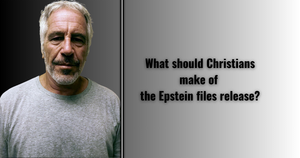While evangelical efforts are succeeding in some parts of Africa, systemic Christian persecution is growing in other parts of the continent. This is, perhaps, most noticeable in the nation of Nigeria.
The religious status of the African continent is complicated. According to an international Journal of Religion and Demography study from Todd Johnson and Peter Crossing, the continent is roughly 49% Christian (includes all other religions that claim to be Christian, as well, like Mormonism, Jehovah's Witness, Catholicism, etc.), 42% Muslim, 8% traditional/native religions, and 1% other.
However, the 51% that are not Christian–especially the 42% that are Muslim–have, historically, not been very tolerant of the 49%.
Because of that, there has been growing persecution in some areas of the world's second-biggest continent. One place this has been especially noticeable is in Nigeria.
According to official demographic data from the American CIA, approximately 54% of Nigeria is Muslim, 45% is Protestant Christian or Catholic, and 1% is something else.
The majority of the northern portion of the country is Islamic, with 12 Nigerian states operating under some form of Muslim Sharia Law. The South is predominantly Christian or Catholic, and the middle of the country is somewhat split.
In the northern and central parts of Nigeria, Christians face immense persecution, both from organized Islamic extremist groups like Boko Haram and from nomadic Fulani herdsmen (who are usually also militant Muslims). However, sometimes attackers cross into southern Nigeria, too.
This piece will take a look at some facts and observations about what is happening to Christians in Nigeria, will examine what the American Left and American Right have had to say on the subject, and will dive into what the Bible teaches that has relevance to the discussion.
Some facts and observations about what is happening in Nigeria
- Militant Muslim extremism is running rampant in Nigeria, especially in the northern part of the country. Boko Haram, the terrorist organization that attacked a US Embassy in 2011 and kidnapped schoolchildren in 2014, leads the way in attacks on Christians in the West African nation.
- What is happening in Nigeria could be classified as attempted genocide. According to the United Nations, genocide is defined as "acts committed with intent to destroy, in whole or in part, a national, ethnical, racial or religious group."
- Though rivals, Boko Haram and the Islamic State's West African Province groups have joined together in their goal to rid Africa of Christians.
- A report out of Nigeria states that more than 200 Christians were killed in the state of Benue in just June of 2025. Another report from NPR alleges that over 160 were killed, many being burned alive, in one attack in July 2025.
- Another recent attack, this one in the southwestern portion of the country, was a 50-person massacre that began during a church service.
- Another report from Nigeria states that at least 125,000 Nigerian Christians have been killed since 2009, the first year of Boko Haram's infiltration of Nigeria. The death toll in the Middle Belt has risen to over 50,000.
- Research conducted by Oxford University estimates that over 2.5 million Christians have been displaced by religious violence in Nigeria, too.
- Since United States politicians have gotten more vocal, the Nigerian government has seemingly upped its efforts against extremists. This week, the army killed around 50 Boko Haram terrorists.
What the Left says about what is happening in Nigeria
Though there is some public concern about Nigerian Christians amongst liberal politicians, there has not been much significant outcry or tangible support given by American Democratic leaders.
- Texas Democratic Representative Henry Cuellar, like Moore, has petitioned for Nigeria to be labeled a Country of Particular Concern.
- The Biden Administration received Cuellar's complaints and ruled against them, stating the killings have more to do with social status than religion.
- Nigerian Christian leaders have criticized the United States government for its lack of response. In particular, those leaders have called out former US presidents Barack Obama and Joe Biden.
- Bill Maher, a political pundit who typically votes liberal but doesn't claim to be a Democrat presently, recently spoke about the issue on his show, Real Time with Bill Maher, saying, "I’m not a Christian, but they are systematically killing the Christians in Nigeria. They’ve killed over 100,000 since 2009...these are the Islamists, Boko Haram...This is so much more of a genocide attempt than what is happening in Gaza. They are literally attempting to wipe out the Christian population of an entire country. Where are the kids protesting this?" Other sources even indicate that Maher's 100,000 estimate is too small a number.
What the Right says about what is happening in Nigeria
Republicans are fairly united in their stance of support for persecuted Christians in Nigeria. Some conservative politicians have even requested that international sanctions be placed on the nation.
- Republican Representative Riley Moore of West Virginia has petitioned Secretary of State Marco Rubio to designate Nigeria as a Country of Particular Concern (CPC) due to Christian persecution in the nation and the government's seeming lack of concern with Boko Haram. He was joined by fellow Congressmen Ted Cruz (Texas), Ted Budd (North Carolina), Josh Hawley (Missouri), and others. As of today, that petition is under review.
- Even back in 2018, President Donald Trump attempted to draw attention to Christian suffering in Nigeria. He especially called out Muslim Fulani herdsmen in the Middle Belt for their treatment of Christians, including religion-based murders.
- New Jersey Republican Representative Chris Smith called Nigeria "Ground Zero" for Muslim-on-Christian persecution. He also condemned the Nigerian government for its slow (and sometimes nonexistent) attention to the matter.
What the Bible says
Naturally, Scripture doesn't have anything directly to say about what is happening today in Nigeria. However, there are several biblical principles that clearly apply when discussing the devastating attacks on God's people.
First, death is not the end.
As much as what is happening in Nigeria is saddening and anger-inducing because of the slaughter of those made in God's image and who are adopted into His family, Christians should also feel a sense of joy. That joy doesn't stem (at all) from the atrocious acts of those attacking Christians in Nigeria. Instead, joy should come from the fact that those in relationship with Christ are being brought to their eternal rest with Him.
In Philippians 3:20-21, Paul writes, "But our citizenship is in Heaven, and from it we await a Savior, the Lord Jesus Christ, who will transform our lowly body to be like His glorious body, by the power that enables Him even to subject all things to Himself." He also writes in 2 Corinthians 5:8, to "be away from the body" is to be "at home with the Lord." Because these verses are true, Christians can mourn and rejoice at the same time when another believer is killed. Just as death saddens the Lord, so too can death sadden His people. However, that sadness is swallowed up, and those tears are wiped away as Christians enter eternal fellowship with God in Heaven.
In some of the most recognizable verses in the entire Bible, John explains where this eternal fellowship with the Lord comes. "For God so loved the world, that He gave His only Son, that whoever believes in Him should not perish but have eternal life. For God did not send His Son into the world to condemn the world, but in order that the world might be saved through Him" (John 3:16-17).
This promise is for all Christians who die, whether from old age or unjust murder or any other cause. 1 Thessalonians 4:14 says about the Day of the Lord, "For since we believe that Jesus died and rose again, even so, through Jesus, God will bring with Him those who have fallen asleep."
Believers can rest in and have hope in that promise, both for themselves and for the Church at large.
Christians must desire both justice and mercy.
Righteous anger is appropriate when considering wicked acts such as murder or religious persecution. However, within the confines of the human nature, it is easy to move from righteous anger to sin (Ephesians 4:26-27).
The most obvious way this is seen is in a desire for revenge, but that is not God-honoring. "Vengeance is mine," says the Lord in Deuteronomy 32:35, not man's.
Sometimes, Christian righteous anger can turn into ungodly views of others, as well. While believers should always desire justice (Proverbs 21:15), they should also love mercy (Micah 6:8).
It would be far better for someone guilty of persecuting Christians to come to faith (mercy) AND be held accountable for their crimes (justice). To wish that saving mercy be withheld from another's soul is wicked.
It is worth mentioning, though, that salvation does not excuse a person from earthly consequences.
The Lord hates sin, and the situation in Nigeria stems from sinful hearts. The perpetrators of these crimes are guilty of theft, rape, murder, persecution of God's people, and more. There are eternal consequences for sin (Ezekiel 18:20 says, "The soul who sins shall die") that can only be removed through the atoning work of Christ (Romans 3:23-25). However, if the Lord sees it fit, He will bring about earthly consequences for sin, even if the sinner is one whom He has saved (like David in 2 Samuel 11-12).
In some sense, all believers should expect to be persecuted. The Lord calls His people to persevere.
The persecution occurring in Nigeria is, quite obviously, extreme. In most places and most points in history, it won't look quite this way, but based on what Scripture says, hatred from the world will be coming for all believers.
Jesus spoke in John 15:18-20, "If the world hates you, keep in mind that it hated Me first. If you belonged to the world, it would love you as its own. As it is, you do not belong to the world, but I have chosen you out of the world. That is why the world hates you. Remember what I told you: ‘A servant is not greater than his master. If they persecuted me, they will persecute you also.'"
Christians must persevere in the face of that persecution.
2 Timothy 3:12-14- "Indeed, all who desire to live a godly life in Christ Jesus will be persecuted, while evil people and impostors will go on from bad to worse, deceiving and being deceived. But as for you, continue in what you have learned and have firmly believed, knowing from whom you learned it."
In that perseverance, Christians should rejoice over the earthly growth that results (James 1:2-4) and the eternal reward that comes with it. Preaching in his Sermon on the Mount, Jesus' Beatitudes in Matthew 5:11-12 include, "Blessed are you when others revile you and persecute you and utter all kinds of evil against you falsely on My account. Rejoice and be glad, for your reward is great in Heaven, for so they persecuted the prophets who were before you."
Christians must pray.
From halfway across the world, American Christians can't do much to directly help the believers in Nigeria. What they can do is pray.
Paul instructs the Church in Ephesians 6:18 to pray "at all times in the Spirit, with all prayer and supplication. To that end, keep alert with all perseverance, making supplication for all the saints."
For believers nearer to the suffering of the brothers and sisters in Nigeria (or nearer to other Christian persecution), the Lord commands them to serve compassionately. Verses like Isaiah 1:17 and Psalm 82:3 illustrate this point.
Final verdict
To speak frankly, the persecution and killing of Christians in Nigeria is an extreme level of wickedness. Likely an attempted genocide, the Church in that country is being targeted because the militant groups there hate God and hate His people.
There should be loud outrage, both from Christians who are grieved by the loss of life and from American politicians who recognize evil, even when it is not happening on domestic soil.
However, mixed in with the righteous anger, grief, and anguish, Christians should rejoice. They should rejoice, not in the suffering of their brothers and sisters, but in the reuniting of God's children with their Heavenly Father. "To die is gain," says the Word of the Lord in Philippians 1:21, because to die is to join the Savior in Heaven.
Still, American Christians should pray. They should pray for deliverance for the suffering image-bearers in Nigeria. They should pray for political leaders (both in Nigeria and in the US) to do something about this grave injustice. And they should pray for the perpetrators of this persecution and oppression, that their hearts be softened by the grace of Christ and that they come to saving faith in Him.
Until the Day of the Lord, when He comes for His people, there will be persecution and hardship for Christians because the world rejects God. Believers must persevere through suffering until the day their faith is made sight, whether that comes in the face of tragedy or at the end of a long, Christ-honoring life.




